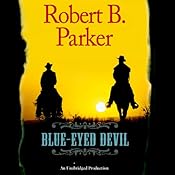Subsequently, the pair moved on to Brimstone

Author Robert B. Parker approached Westerns in the same way he did his other novels: with long strings of dialogue and short chapters. This makes them not only fast reads -- though the laconic delivery of the characters can make them seem longer -- but also highly accessible to readers who may think they don't like Westerns. Actually, Virgil and Everett have a similar friendship as Parker's mystery heroes Spenser and Hawk: Everett is the narrator and main filter for the action, the relatable one, but Virgil, like Hawk, is the more mysterious and therefore more intriguing character.
Virgil Cole's skill with a firearm is legendary, and Parker gives it a mythic spin. Always calm and relaxed, Virgil's draw looks leisurely, but it is always faster than anyone else's. But my favorite aspect of the characters is that Virgil is well-read while Everett is well-educated. (Virgil regularly refers to Everett's time at West Point.) Neither is both, which means they often share knowledge with each other, and consequently with us. From the philosophy of Rousseau to the viability of the Macedonian phalanx in modern warfare, there is a lot to learn in Parker's Westerns in addition to terrific reads.
Blue-Eyed Devil is likely the final Parker Western, and that's too bad because these four novels have been some of my favorite reads of his. They are also some of the most readable modern Westerns available, and when an author of Parker's stature publishes a Western, it gives the genre some much-needed attention. The story as told comes full circle with new beginnings and old familiarities, but I wouldn't mind seeing the series continued by other hands.
The first name that comes to mind is that of Robert J. Randisi. Parker and Randisi share a skill with dialogue that says more than it seems to, and Randisi has also written his fair share of private-eye novels. Also, they both seem to follow the popular Strunk and White dictum to "omit needless words," resulting in the abovementioned brevity of dialogue and chapter. Because of these similarities, I think Randisi would be able to take over the series with little disruption, and I hope the publisher (and the author's estate) will consider this option to continue the Cole and Hitch stories.
Blue-Eyed Devil







.png)




















2 comments:
Thanks for the review. I enjoyed the other books in the series as audiobooks, but have hesitated picking up this one because it is so short. Looks like it is still a good choice.
I didn't notice that this one was considerably shorter than the last two. Parker still managed, as usual, to pack a lot of story in. :)
Post a Comment